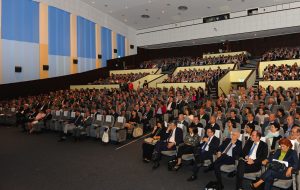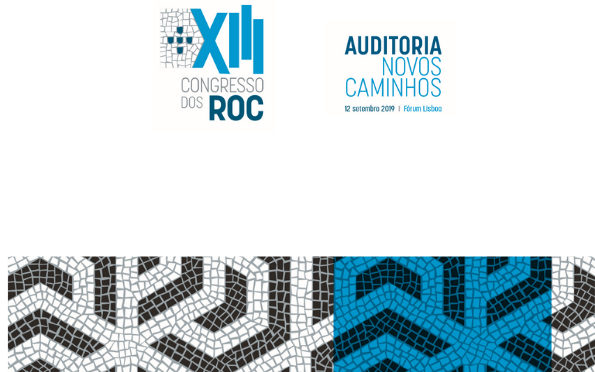Auditing cannot be seen as a commodity

The Statutory Auditors (ROC) met today at their 13th Congress to reflect on the new paths of the profession. The debate highlighted the new demands made on auditors, which in turn require the recognition of value by stakeholders and the necessary support. of managers andgovernance, supervision and oversight.
Lisbon, September 13th, 2019 - The 13th Statutory Auditor Congress, which took place today in Lisbon, brought together leading speakers to debate the new reality of auditing and the role of Statutory Auditors as key players in an ecosystem that guarantees the efficiency of processes and the quality of information made available to the market, in an increasingly complex and sophisticated context. Auditing cannot be seen as a commodity.
As Óscar Figueiredo, Coordinator of the Organizing Committee of the XIII Congress of the OROC, "some of the new paths of auditing include the use of more and better technology in our work processes in response to the constant technological evolution present in the businesses developed by our clients, the appropriate application of the relevant auditing standards in each case, the more demanding exercise of professional skepticism and reasoned professional judgment, and teams with multidisciplinary skills and competencies acquired through continuous education and training. All this is demanded by stakeholders".
In view of the investment required, we ask stakeholders the payment of a fair price, and "Auditing cannot be seen as a commodity and, in this regard, we have a responsibility not to accept prices that do not reflect the competence and investment required of us."
For the head of OROC, guaranteeing more quality in auditing is a shared mission, stating that "We have our responsibilities on the road to improving the quality of our services. But we must not forget or confuse our responsibility with the responsibility of others. Auditors are part of what is known as the ecosystem of an entity's financial reporting chain, which also includes, first and foremost, directors and other members of management, and those in charge of governance and other members of supervisory and oversight bodies. Only by all working together to the same end will we all be in a position to contribute to the public interest."
An idea of the public interest of the profession was reflected in the speech by the Deputy Minister for the Economy. Addressing the audience at the event's closing session, Pedro Siza Vieira stated that "It is not possible to achieve economic growth without qualified professionals accompanying our companies, our investors and external investors in making these efforts a reality. This is the role of Statutory Auditors, this is the role of auditors. And since this is a profession that questions itself, that faces different problems, I have no doubt that it will necessarily have to play a very important role in the modernization of our economy, in the modernization of our companies."
Throughout the day, there were several testimonies on the new paths of the economy and business, artificial intelligence impregnated in new processes, the digitalization and virtualization of transactions, the increasingly ethereal ways of storing, communicating and reporting information and spreading it on a global scale and keeping this information safe from intrusion through the use of security solutions. blockchain, cryptocurrencies, machine learning e big data.
Fernanda Ilhéu, Professor at ISEG and researcher, outlined an analysis of the global macroeconomic context, highlighting the new balance and challenges associated with the evolution of the path and ambition of world powers, particularly the Chinese case.
A contextual analysis that also looked at the current technological environment, specifically with regard to the most recent issues raised by the use of Artificial Intelligence. Afonso Seixas Nunes, a Jesuit priest and lecturer at Oxford University, stressed the need for immense reflection on the subject, not only technological, but also ethical, legal and philosophical. The President of the Instituto Superior Técnico, Arlindo Oliveira, warned that we need to be prepared for very disruptive technologies, which we don't yet know about but which are likely to happen.
Also reflecting on the new challenges contained in the new digital reality, the use of data and public trust, António Gameiro Marques, Director General of the National Security Office, points out the new character of data which, contextualized, is transformed into information and is aimed at the raw material of the 21st century: Knowledge. Nicolau Santos, President of LUSA, says that the issue of trust and social networks is now at the center of any discussion. A debate that presents disturbing data of which it is essential that we are aware.
Sustainability, in the processes developed and in the relationship with clients and society in general, was highlighted in a panel that brought together Isabel Ucha, President of Euronext, for whom the financial world and the capital market must contribute more to achieving sustainable development goals, and Alan Johnson, Vice-President of the International Federation of Accountants (IFAC), who sees the profession as critical to building trust in society, in the public and private sectors, in large corporations and family businesses, making auditors reliable, sustainable and ethical advisors. Francisco Miranda Rodrigues, President of the Portuguese Psychologists' Association, defined the human factor as essential and the element that will have the greatest impact on the evolution to be expected in the future.

